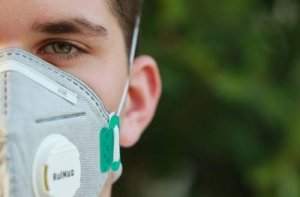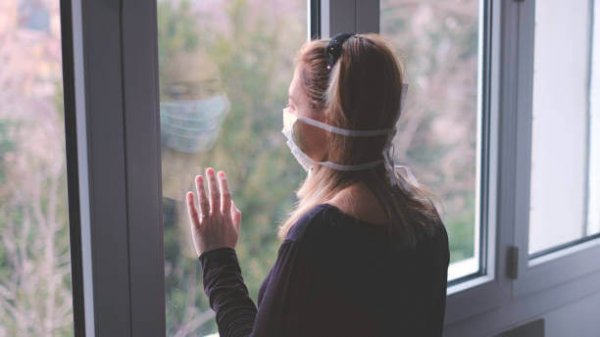Looking at the World Through a Mask: The Psychological Impact


Written and verified by the psychologist Valeria Sabater
Hygienic, surgical, FFP1, FPP2, FPP3… our language has been “enriched” with terms we wish we’d never had to learn. However, current realities dictate our language and also have an evident psychological impact. We’re beginning to see the world through a mask and it looks like it’s going to become a regular aspect of our lives for a long time to come.
Some people tell us that we have to follow the “Asian example”, meaning imitate the Japanese, Chinese, or Korean people in their regular use of masks as a strategy to avoid contagion. For this large group, far from being an obligation or a new behavior pattern, it’s actually the result of something that’s become ingrained into their culture from ages past.
On one hand, they consider it a lack of respect to even have a simple common cold and infect others by sharing the same areas. The other factor is the contamination of the big Asian cities or the very fine dust particles that sometimes arrive from the Gobi desert. Wearing a mask is part of their daily lives.
In direct contrast, in the Western world, the word “mask” is something that has created panic and unease, as we’ve heard the contradictory words from official sources about whether these items are recommended for use by the general population. We’re now seeing that it’s going to be a recurrent and necessary element in the coming days.

The world through a mask, how can it affect us?
The world through a mask doesn’t look the same. It’s uncomfortable, strange, and out of tune with our normal day to day lives. Furthermore, it isn’t only the mask, but also the fact that it’s arrived with gloves, hand sanitizer, and, in some cases, even protective visors.
Something that was a normal item for health workers is now just as basic and essential for us, creating a barrier that can help protect life itself.
For those who don’t form part of the heroic health care service, their daily lives have changed in many different ways. Let’s admit it, masks are the metaphor of the current pandemic. They’re the icon that accompanies us these days and that has completely altered our reality in every way. All of this is having a profound psychological effect on our lives.
Uncertainty and fear: What if I don’t wear one? What if I can’t buy one? What if it doesn’t protect me?
Doubts, concerns, and worries. These accompany our everyday lives and increase anxiety in so many people. The fear of contracting the coronavirus leads us to take protective measures that go beyond hand hygiene and social distancing.
If we were reluctant to use them at first, social pressure and constantly seeing people with their faces covered has created the “need” to buy them. However, the lack of stock in pharmacies and other places further increases this restlessness, fear, and obsession to acquire them.
Because of their scarcity in the current market, many have started to make them themselves. However, by using home-made fabric masks, this can cause even more distress. Why? Because we fear that it’s a very weak protective measure and that we won’t be properly protected. This can also trigger anxiety in certain cases.
Our reality has changed
Seeing the world through a mask leaves an imprint on our mind and tells us that everything has changed. Now, every time we leave the house, in addition to our cell phone, wallet, and keys, we carry a mask with us. It doesn’t matter if it’s hygienic, surgical, or FPP3. Life no longer looks the same; everything seems strangely distorted.
We know that this will all be temporary. We believe that, after a time, this virus that arrived so unexpectedly will eventually lose its virulence. And, finally, we assume that scientists will create treatments and vaccines to fight it, and, as far as possible, to help us return to our everyday lives.
However, having to include this element in our daily lives shows the presence of the virus itself. It makes it obvious and reminds us that we have to “protect ourselves from the enemy”.
This reality can have a diverse impact on us all. Some people will accept it as normal. But others will put on masks with anxiety and distress, unable to get used to this new habit.

Masks don’t stop pandemics but do filter out fear
WHO Director-General Tedros Adhanom said that he was concerned about the massive use of medical masks by the general population. This almost desperate search to find them means that those who really need them may go without.
However, industries in every country have started making them. In a short time, we’ll be self-sufficient in making them and it’ll be easy to buy them in pharmacies. However, we can’t ignore the obvious fact that masks don’t stop pandemics. They don’t stop this virus 100% by themselves. They do, however, filter out our fear.
The world through a mask looks strange and has changed considerably. However, the vast majority of people want and need them in order to feel less concerned and have another measure of protection in addition to all the others.
In conclusion, we don’t know how long the effects of the current pandemic will last. Nor do we know whether the use of these protective masks will be temporary or whether we’ll have to get used to them at certain times and in certain situations.
Be that as it may, one thing is undeniable. Life changes at the most unexpected times, and we must be prepared to adapt to new situations.
This text is provided for informational purposes only and does not replace consultation with a professional. If in doubt, consult your specialist.








